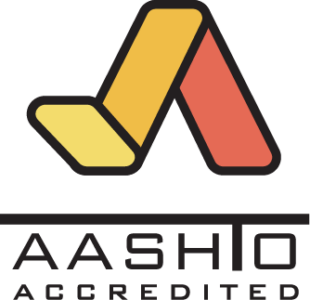AASHTO accredited
 The Asphalt Innovation Laboratory has state-of-the-art equipment and world-renowned researchers to investigate, develop and deploy improvements in asphalt technology, focusing not only on defining problems, but solving them, and helping implement the solutions. The researchers in this lab encompass a holistic approach to pavements, including intricate modeling, chemical analysis, physical testing, and field investigation to provide research sponsors with the most thorough analysis of new products and answers to their problems.
The Asphalt Innovation Laboratory has state-of-the-art equipment and world-renowned researchers to investigate, develop and deploy improvements in asphalt technology, focusing not only on defining problems, but solving them, and helping implement the solutions. The researchers in this lab encompass a holistic approach to pavements, including intricate modeling, chemical analysis, physical testing, and field investigation to provide research sponsors with the most thorough analysis of new products and answers to their problems.
A better understanding of asphalt through the innovations developed in this lab is leading to pavements that rut and crack less, are longer lasting and ultimately cost less over their designed life. In addition, asphalt research has the ability to penetrate other infrastructure elements, such as advancement in the asphalt shingle industry used for roofing.
TTI’s long history of developing safety improvements for skid resistance and splash-and-spray has been both life-saving and life-cycle cost-reducing. The laboratory’s chemistry program has been instrumental in addressing ways to improve the longevity of roads, as well as evaluating the quality of asphalt binders. Our asphalt mixture researchers have been integral in:
- recycling of asphalt pavements for environmental purposes,
- development of new procedures for mixture design,
- providing research sponsors with new pavement structural designs,
- mitigating noise from pavement surfaces,
- developing new methods to recycle materials in-place,
- developing ways to more thoroughly test pavements in a non-destructive manner, and
- measuring the ride quality for the traveling public.
The laboratory includes an extensive array of personnel, facilities, equipment, networked computing hardware and software, and research services to support research projects and allow for a multitude of efficient asphalt binder and mixture tests and analyses to achieve the objectives of research projects and produce practical deliverables based on sound engineering.
Researchers are involved in the design, development, and evaluation of new materials, new construction techniques, and new test procedures.
Below are more detailed descriptions of specific facilities.
facts
Add a Title
Add a Title
Add a Title
Add a Title


